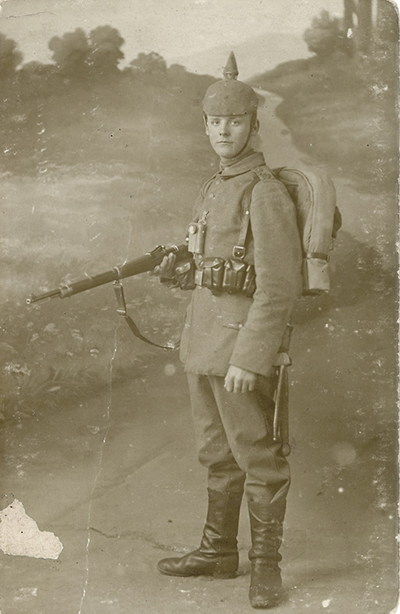
Victor Altesleben, Musketier
Victor Altesleben was born on October 29, 1898 in the small village of Danne-et-Quatre-Vents in Alsace-Lorraine, a jurisdiction that switched back and forth between France and Germany many times over the centuries. It was under German control at that time of Victor’s birth.
“When we had the war out there, we belonged to Germany. But the Germans couldn’t do much with us. We didn’t like them, see. We were from Alsace-Lorraine. We were not welcome by the Germans, we were not welcome by the French either. We were in between. Whoever kept us, we had to stay with ‘em,” Victor said in a 1988 interview with his daughter, Joyce and granddaughter, Lynn.
On October 29, 1916, Victor turned 18 and was conscripted to fight in the German Army, just one month after his brother Ernest died fighting in the Somme. Victor was assigned a Musketier, Infanterie-Regiment #44, Kompagnie 7. He was first sent to Goldap, Poland on the Eastern Front.
“First when I went in, it was on the Russian front. That’s where I got shot,” Victor recalled.
“When I got shot, I was standing at the lookout post. I didn’t know I was shot. All of a sudden, I was standing up like that, ‘Ah!’ I said to the fella, blood running down my arm,” Victor recalled.
“They brought me back from the front in the horse and buggy wagon to the Red Cross back there, into the hospital there, see, and I came in the evening, and I say, ‘Hell, I’ve got some pains in my back’ and they say, ‘That’s all right, sit down there, in the morning they’ll take care of it’.’The morning??!!!’” he laughed telling the story. “So I sat there on the post, like that, couldn’t lie down even. So, in the morning, ‘Hey, where is that fella?’ So, they hauled me out, opened it up and got that bullet out and said, ‘Here it is.’ it went through my shoulder and back there, see,” he said pointing to his right shoulder.
“We were on the Russian front for a while and then they sent us to the Western front,” he continued.
“And not much to eat. You get a loaf of bread that size and about that high. One loaf. Water if you can find it down in the trenches somewhere. The hole somewhere, we had wells for water, see. Then we had a little bit of coffee in the morning and coffee at night. And two slices of bread. How can you live with that? You always had an empty stomach,” he recalled.
“But I got some packages from home. I had it a little bit better than some of them. Some guys from Berlin, the officers, they had nothing. And when they get something from someone, they’d send it home to their family. They wouldn’t even eat it, sent it home to their wife and kids. They had less than the army even. I got packages from home. I said, ‘Here, well, I’m not too hungry, I can stand another one. Take my bread and send it home to your family there’ So, the officers, they didn’t want to let me go! They wanted me to stay with ‘em,” he chuckled.
“I had to fight for them, but at the end I refused because it was getting too hard. If I go to the front, I’m gonna get killed and I knew it. In Belgium, when we went there, we met some boys from our regiment —‘Hey,’ he said, ‘you see that little church up there? That’s what’s left of the 2000’ (of our regiment). Oh they really killed ‘em in 1918,” he said sadly.
“Then I ran away. They didn’t have no more control over me. In the summer time, I was here and then the next day I was somewhere else, I told ‘em ‘I’m not going to fight for you people because I’m not going to shoot my own people in the French army,’ so they pulled us (the soldiers from Alsace-Lorraine) all out. We left. Said we’re not going to fight for them anymore. If I would’ve waited any longer, they would’ve taken me prisoner yet, see, but I stayed in the woods—me and another guy.”
“When did I get out of the army? I don’t know, I’m still in it!! I’m not discharged nowhere. I don’t have any discharge papers or anything!” he laughed. “So, the Germans lost the war. Alsace-Lorraine went back to France. They were always French,” he said matter-of-factly.
“They used to say, ‘You’re Alsace-Lorraine, you’re lucky!’ because they couldn’t force us to go to the front anymore. We wouldn’t go anymore, we just refused to go. And they couldn’t shoot us in 1917. If it had been 1914, you couldn’t do it, see, because it (Germany) was too strong,” he said.
When the war ended, the Treaty of Versailles restored the provinces of Alsace-Lorraine back to France. A year later, Victor moved to Paris, learned to speak English, and worked as a domestic for a Countess at the Greek Embassy and then as an assistant to the Greek Ambassador to France. After that, he got a job working for the French Lines. As an employee there, in 1925, he got a discount on a second-class ticket to the United States.
“Why did I come to America? Just like some other fools!” he laughed. “Well, we all are like that. Well somebody came to America, well you want to go there too when you’re young.” he explained.
Settling in Dearborn Michigan, Victor met his Irish American “Petit Cherie” Caroline. Together, they raised seven children. On May 11, 1931, Victor Altesleben became a United States citizen. He died on December 3, 1990 at the age of 94, leaving a legacy of 28 American grandchildren.
Book dedicated: The Splintered Empires: the Eastern Front 1917-21 by Prit Buttar
